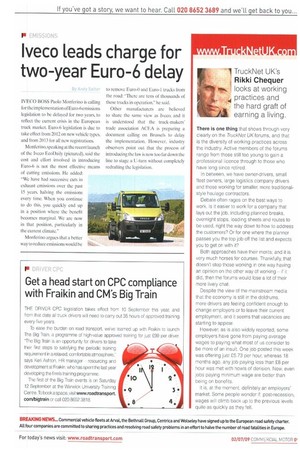TruckNet UK's Rikki Chequer looks at working practices and the hard graft of earning a living.
Page 9

If you've noticed an error in this article please click here to report it so we can fix it.
There is one thing that shows through very clearly on the TruckNet UK forums, and that is the diversity of working practices across the industry. Active members of the forums range from those still too young to gain a professional licence through to those who have long since retired.
In between, we have owner-drivers, small fleet owners, large logistics company drivers and those working for smaller, more traditionalstyle haulage contractors.
Debate often rages on the best ways to work. Is it easier to work for a company that lays out the job, including planned breaks, overnight stops, loading sheets and routes to be used, right the way down to how to address the customers? Or for one where the planner passes you the top job off the list and expects you to get on with it?
Both approaches have their merits; and it is very much horses for courses. Thankfully, that doesn't stop those working in one way having an opinion on the other way of working if it did, then the forums would lose a lot of their more lively chat.
Despite the view of the mainstream media that the economy is still in the doldrums, more drivers are feeling confident enough to change employers or to leave their current employment, and it seems that vacancies are starting to appear.
However, as is also widely reported, some employers have gone from paying average wages to paying what most of us consider to be more of an insult. One job posted this week was offering just £5.73 per hour, whereas 18 months ago, any job paying less than £8 per hour was met with howls of derision. Now, even jobs paying minimum wage are better than being on benefits.
It is, at the moment, definitely an employers' market. Some people wonder if, post-recession, wages will climb back up to the previous levels quite as quickly as they fell.
















































































































































